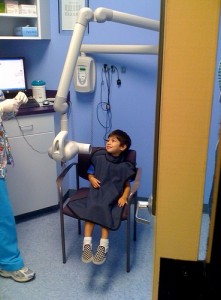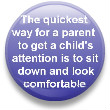 When I was in college, I started a job at a pediatric dental office. I continued working there after I graduated, until we moved overseas. I did a lot of admin stuff as well as chair-side (assisting the hygienist or the doctor), and I loved how so many parents brought their kids to our office and asked great questions about dental health. Here are a few things I learned from the doctors during my years there:
When I was in college, I started a job at a pediatric dental office. I continued working there after I graduated, until we moved overseas. I did a lot of admin stuff as well as chair-side (assisting the hygienist or the doctor), and I loved how so many parents brought their kids to our office and asked great questions about dental health. Here are a few things I learned from the doctors during my years there:
1. Limit snacking – This is the main cause of tooth decay. During mealtime, our mouth produces enough saliva to keep our teeth relatively clean (we still need to brush though!), but snacking on sugary foods in between meals will “feed” the bacteria in your mouth, which produce the acid that can eat away at the tooth enamel and cause decay. It’s important to limit snacks to fresh fruits and vegetables, meat, and dairy (plain yogurt, eggs, and cheese are your best choices). Candies are of course on the “rarely/never eat” list, but many parents were surprised to find that even carbohydrates can be dangerous if consumed frequently, especially processed foods which contain refined flour and added sugars. Granola bars, crackers, and other “weak candies” should be kept to a minimum. Amelia had a great post on snacking last year — notice how almost all of her bread-related snacks contain whole wheat flour with little or no added sugar! In addition, beverages such as juice, soda, iced tea, flavored milks and sports drinks can lead to dental caries. My boss always recommended diluting juices with water when giving them to kids, and limiting the amount of juice per day. Teenagers are particularly vulnerable in this category, because many of them have terrible snacking habits. For them, sodas, convenience foods, and breath mints are the biggest culprits of tooth decay, so try to keep these items to a minimum in your house.
2. Cavities are NOT just the result of bad brushing or snacking habits – First and second permanent molars can be deeply pitted and grooved, and occasionally, during tooth formation, the tooth enamel will not fuse completely, creating small fissures that are incredibly difficult to keep clean. Even with good brushing and snacking habits, these teeth can get decay. Some dentists choose to fill these early on to prevent greater problems in the future.
3. Get sealants when your dentist recommends them – One of the things I saw time and time again was a child who had been a candidate for sealants at one visit come back six months or a year later with dental caries on those teeth, and they had to have those teeth filled instead. Usually sealants are placed on the chewing surfaces of permanent molars and premolars (bicuspids), but occasionally doctors will suggest sealants on baby molars. Sealants generally last three to five years (although sometimes longer), and they really save you money in the long run by avoiding fillings, root canals and crowns to repair decayed teeth. Most insurance companies cover sealants, but a few don’t. Some parents are reluctant to get sealants because their insurance company doesn’t cover it. I would encourage them to get their child sealants anyway; talk to your dentist about a payment plan if money is a concern. Most offices are pretty accommodating, especially if you are an established patient there.
4. Braces are bacteria magnets! – Many teens (and preteens) just don’t have good habits when it comes to oral hygiene. And, as it is practically impossible to give advice to teenagers without getting the customary eye-roll, talk to your dentist about showing them how to keep their teeth healthy and clean while wearing braces. Children with braces are more likely to develop tooth caries and/or experience early gum recession due to poor brushing and flossing habits. Personally, I’ve noticed that young teen boys (around age thirteen or so) are the worst when it comes to keeping their braces clean, but I’ve witnessed this in a few girls as well. As a former wearer of braces, I know how difficult it can be to keep those babies clean, but fortunately there are a wide range of products to aid us in this area. My personal favorite is Waterpik’s Power Flosser.
5. Children with good brushing and snacking habits usually grow up to be teenagers and adults with good oral hygiene – The earlier your child learns the importance of brushing, flossing, and healthy snacking, the more likely they are to continue these habits into adulthood.
I feel like I could write a whole book on this subject, but I’ll stop for now. I might continue this post with a second installment if anyone’s interested. So, what about you? What are some important lessons you’ve learned from the dentist about your child’s dental health?
For more information:
TMC article: Last June, McKenna wrote about surviving your child’s first dental visit.
Website: Keeping Your Child’s Teeth Healthy at Kidshealth.org
Book: Eat This, Not That! Supermarket Survival Guide
Photo courtesy of .imelda








